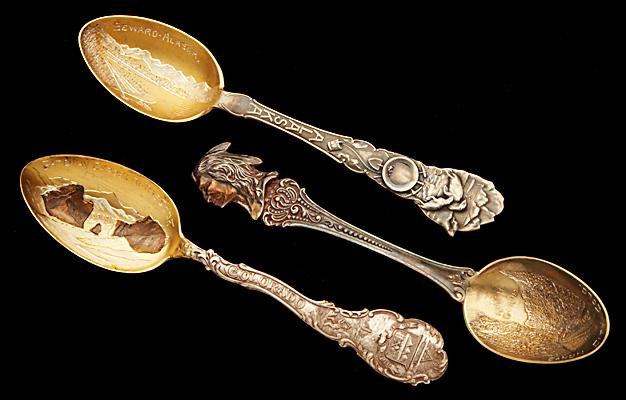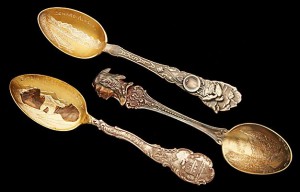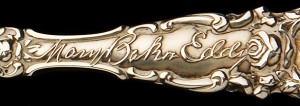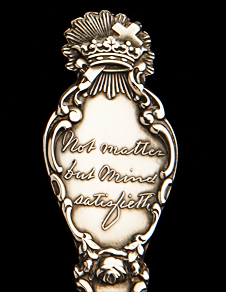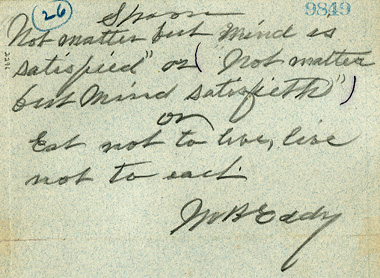Souvenir spoons representing many localities, causes, and events were very much in demand from the 1890s through the 1920s. They were purchased as mementos of trips and vacations and also as gifts. We find a number of these spoons in the collections that were gifts to Mary Baker Eddy.
These spoons commemorate various places, including Salt Lake City, Utah; Atlanta, Georgia; Pueblo, Cuba; Nashville, Tennessee; Seward, Alaska; Boston, Massachusetts; Arkansas City, Kansas; and a group from Colorado representing Boulder, Soda Springs/Cañon City, Gate Way Garden of the Gods, and Royal Gorge.
Christian Science Souvenir Spoon
There are a number of souvenir spoons associated with Christian Science, but the one for which Mary Baker Eddy gave her approval has a cross and crown at the end of the handle, Eddy’s likeness and signature on the front of the handle, and her Pleasant View home in the bowl of the spoon.
 The spoon was designed by Frederick R. Roberts for the Christian Science Souvenir Company of Concord, New Hampshire. The company consisted of three Concord businessmen, George F. Durgin, Allan H. Robinson, and George Moses. The William B. Durgin Company, owned by George Durgin’s father, first manufactured the spoons in 1898 for the Christian Science Souvenir Company. The teaspoons were made in sterling silver, sterling with a gold wash, and gold plated sterling. Two solid gold spoons were made as presentation pieces; one was given to Eddy and the other to The First Church of Christ, Scientist, Boston. Both are found in the Library’s collections today.
The spoon was designed by Frederick R. Roberts for the Christian Science Souvenir Company of Concord, New Hampshire. The company consisted of three Concord businessmen, George F. Durgin, Allan H. Robinson, and George Moses. The William B. Durgin Company, owned by George Durgin’s father, first manufactured the spoons in 1898 for the Christian Science Souvenir Company. The teaspoons were made in sterling silver, sterling with a gold wash, and gold plated sterling. Two solid gold spoons were made as presentation pieces; one was given to Eddy and the other to The First Church of Christ, Scientist, Boston. Both are found in the Library’s collections today.
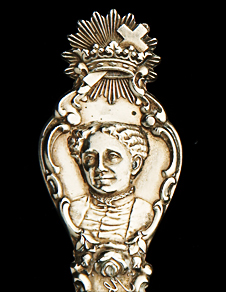 One of the unique features of the spoon is the motto. The statement came to Eddy one night months before the idea of a spoon was presented to her and, as was her custom, she asked her secretary to write it down and file it. When requested for a saying or motto for part of the spoon’s design, Eddy said she had just what was needed and offered the statement. (For more information on this, see Calvin C. Hill’s reminiscence, which is available in the Library’s Research Room. Excerpts from the reminiscence may also be found in the book We Knew Mary Baker Eddy, titled “Some Precious Memories of Mary Baker Eddy.”)
One of the unique features of the spoon is the motto. The statement came to Eddy one night months before the idea of a spoon was presented to her and, as was her custom, she asked her secretary to write it down and file it. When requested for a saying or motto for part of the spoon’s design, Eddy said she had just what was needed and offered the statement. (For more information on this, see Calvin C. Hill’s reminiscence, which is available in the Library’s Research Room. Excerpts from the reminiscence may also be found in the book We Knew Mary Baker Eddy, titled “Some Precious Memories of Mary Baker Eddy.”)
In the February 1899 issue of The Christian Science Journal, Eddy encouraged Christian Scientists to purchase the spoons. However, they were not sold to raise funds for any Church-related project; all profits went to the Christian Science Souvenir Company. (It was falsely rumored that Eddy herself received a share of the profits. In fact, the spoon was one of the means by which she supported the Concord community.) Although it was announced that the spoons would be sold in Christian Science Reading Rooms, this does not appear to have taken place. (The announcements appeared in the January 1899 Journal, page 738, and in the February 1899 issue, page 742.)
In 1905, with the passing of both father and son, the Durgin Company was sold to the Gorham Manufacturing Company. Although this appears to mark the end of the Christian Science Souvenir Company, of which son George was a partner, the spoons continued to be manufactured by the Durgin Company as a branch of Gorham, and were sold by the J. C. Derby Company of Concord.
Interest in the spoon seemed to wane in the 1920s as did interest in souvenir spoons in general. In 1949 Gilbert C. Carpenter, Jr. and Stanley Jacoby located the original molds for the spoon and formed the Jubilee Spoon Company of Bridgeport, Connecticut. They sold spoons into the 1950s and 1960s. There is no identifying mark on these spoons to distinguish between original issues during Eddy’s lifetime and later productions, though the design detail on the later spoons tends to be less distinct than on the earlier spoons, especially in the area of the motto and signature.

